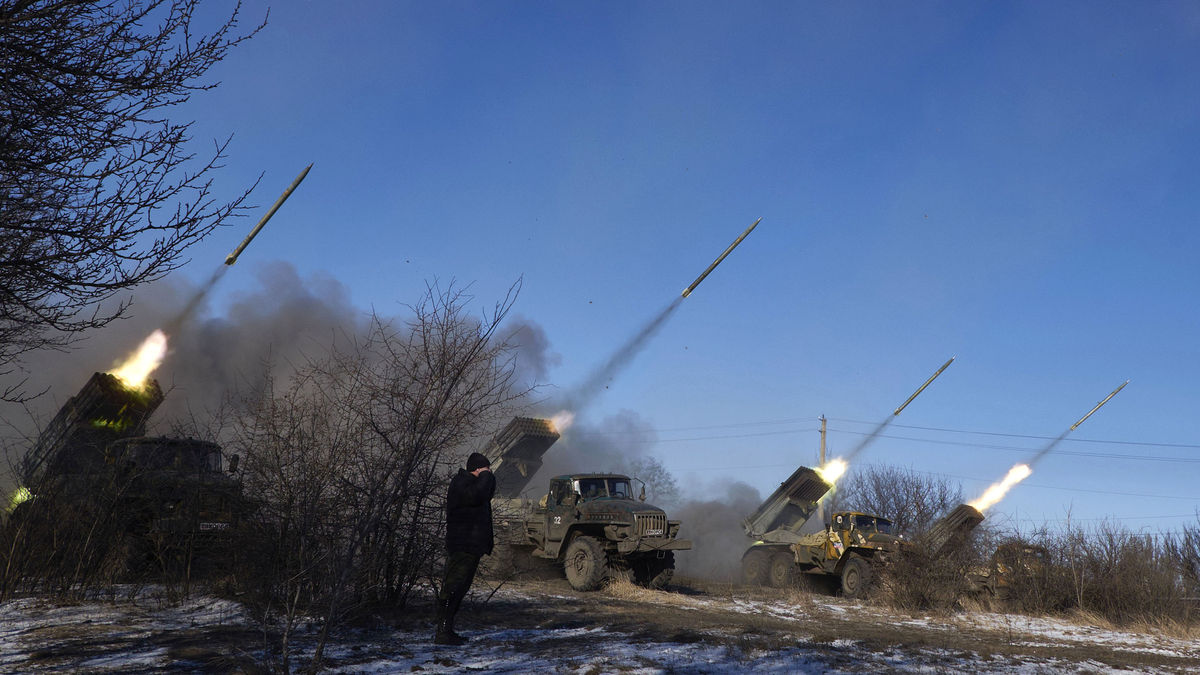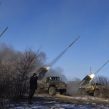
After Debaltseve—Is There Chance for Ceasefire?
Publication: Eurasia Daily Monitor Volume: 12 Issue: 33
By:

It is entirely correct to say that the “Minsk Two” agreement, reached on February 12, after painstakingly long talks between the leaders of Ukraine, Russia, France and Germany, was broken inside the first week of implementation. Yet, as the battle for Debaltseve has drawn to its predictable end, the opposing parties may find it opportune to take a break from the trenches (RBC.ru, February 18). Ukraine has suffered another humiliating defeat, and President Petro Poroshenko needs time to deal with its consequences, though he would perhaps do better by not denying the scale of this tactical disaster (Kommersant, February 21). The rebels also need a few weeks to replenish supplies, and they depend entirely upon the arrival of new echelons of heavy arms and truckloads of “volunteers” from Russia (Kommersant, February 19). Most importantly, President Vladimir Putin needs to prove that his signature on the peace-of-sorts document is worth something and that he is in control of the oscillating crisis.
Debaltseve, in and of itself, may be of little interest for Putin, but he has to make sure that this “victory” puts him in a more advantageous position for maneuvering in the European political arena (Ezhednevny Zhurnal, February 20). Chancellor Angela Merkel and President Francois Hollande may be fed up with Putin’s crude lies and self-righteousness, but he wants to ensure that they, nevertheless, keep coming back to him pleading for a new ceasefire. He scored an important point in this game of broken agreements by making a visit to Hungary last Tuesday (February 17) and was ready to grant Prime Minister Viktor Orban generous concessions in the gas business in exchange for the opportunity to demonstrate that European unity in opposing Russia has deep cracks (Polit.ru, February 18). Moscow is also attentively watching the development of the financial calamity around Greece, expecting that an earthquake in the euro-zone will further weaken the resolve of European politicians to protect Ukraine against Russia’s pressure (Nezavisimaya Gazeta, February 18).
Pretending that the Minsk format can still deliver a de-escalation of hostilities, Putin also seeks to keep the United States out of the Ukraine conflict management process. Therefore, Russia presented to the United Nations Security Council a perfectly agreeable draft resolution in support of the Minsk deal, which Moscow had no intention of implementing (Forbes.ru, February 18). The Kremlin is keenly following the debates in Washington on the issue of supplying Ukraine with arms but tends to see in them a sign of discord in the US establishment rather than a feature of democratic decision-making on a question of potentially serious commitment (Rossiiskaya Gazeta, February 15). Quite probably, Putin’s courtiers will be instructed to respond to the sharp criticism from US officials regarding the Debaltseve “episode” not with counter-punches but with pledges of peace in order to make sure the arms issue remains unresolved in Washington and the talk about new sanctions remains just talk (Newsru.com, February 21). However, what the masters of the Russian state cannot grasp—but should be worried about—is the profound shift in US public opinion, which, according to a recent Gallup poll, now regards Russia as the United States’ most dangerous enemy (Moskovsky Komsomolets, February 17).
This perception gives direction to President Barack Obama’s course on containing Moscow based on the simple premise that Russia does not have a robust or healthy-enough economic base for sustaining confrontation. Putin remains in denial, and government officials decry as “politically motivated” the decisions of Moody’s and Standard and Poor’s to downgrade Russia’s credit rating to “junk” status (RBC.ru, February 21). But in fact, the government’s anti-crisis plan aimed at stimulating growth and prescribing haphazard cuts in budget expenditures deserves exactly this characteristic (Gazeta.ru, February 20). The measures that are actually necessary are elementary—to cancel the self-defeating counter-sanctions, to curtail the defense expenditures, to fire the most blatantly corrupt executives from state-owned corporations—but plain impossible for the Putinist regime (Vedomosti, February 17). The government is, thus, left with the impossible task of covering rising state obligations with falling revenues and resorting to creative accounting while not even trying to calculate the costs of supplying the separatist “rump Novorossiya” territory in eastern Ukraine with war ammunition and gas. Pundits may crack cheap jokes about the price on bananas breaking through a “psychologically important” ceiling, but the fact of the matter is that falling incomes in Russia are occurring alongside inflation climbing to 20 percent (Newsru.com, February 21).
This economic trajectory is certain to bring a rise in discontent, and Putin’s “political technologists” are trying to pre-empt it by mobilizing social groups that are prone to aggressive protests. One element of this plan was enacted last Saturday in downtown Moscow where some 40,000 “patriotic activists” were gathered (for a modest remuneration) to express their outrage against the Ukrainian “Maidan” on the anniversary of the tragic events in Kyiv that took down the corrupt regime of former president Viktor Yanukovych (Novaya Gazeta, February 21). The stimulated urge to exterminate the liberal “fifth column” was ugly; but even uglier was the additional attempt to suppress domestic discontent by targeting the opposition rally scheduled for March 1 (BestToday.ru, February 20). Alexei Navalny, who sought to reinvigorate the Russian anti-war movement with this rally, has been, yet again, put under arrest (Gazeta.ru, February 20).
These Russian domestic disturbances have a direct bearing on the prospects for a ceasefire to hold in eastern Ukraine’s war zone. This undeclared but incessantly trumpeted war has become the main content of Russian politics, so that every curtailing of democratic freedoms at home is justified by it, while all the country’s mounting economic hardships can only be explained away by the discourse of a security emergency. Putin’s regime has quickly evolved into a war clique that depends upon a virtual mobilization around a military-patriotic agenda, but it cannot organize anything resembling a real mobilization of the economy where corrupt rent-harvesting remains the prevalent mode of doing business. In every pause, the picture of Russia’s irreversible economic decline comes into focus, so the proposition for stimulating public support with yet another “victory” becomes imperative. A ceasefire may be useful for knocking Russia’s external enemies off balance, but it has to be broken before sobering Russians start asking questions about where the war path is actually leading. Merkel’s and Hollande’s best intentions may, perhaps, buy a few weeks of relative calm, but then—Mariupol (Mariupil) could be next.




